This week on Comms Spotlight, we meet Judith Olang, a Comms professional who’s built a career not just on telling stories but helping shape the policies behind them. Judith is passionate about Communications and Advocacy and in her interview with us, she gives a detailed breakdown of what working in this field entails. As with most communicators, her interest in Comms started in her childhood. Currently, Judith works as the Program Manager at Sharing Strategies an international coordination platform working across advocacy, finance, and delivery.
How did you begin your career in Communications?
I didn’t walk into Communications by accident; it was a marathon toward it, slowly but surely. As a child, I wanted to be a lawyer (a story itself). But in a home filled with newspapers thanks to my dad’s daily habit, I was fascinated by how stories influence people’s thinking. I also loved writing, and I was good at it. At some point, I can’t say when, but before I joined university, I decided I wanted to be a communications officer. That became my goal.
I went on to study Journalism, with a minor in integrated studies, gender, and organisational behavior, a little bit of everything. At the time, I couldn’t connect the dots. But God, in His infinite wisdom, already had the whole picture.
A year into working, I was a comms officer. And through hallway conversations and sheer curiosity, I stumbled upon policy engagement and advocacy. That shifted my trajectory completely. Since then, I’ve built a career focused on development communications, not just telling stories, but helping shape the policies behind them.
Tell us about your role as the Program Manager at Sharing Strategies.
I recently began a new assignment as Program Manager at Sharing Strategies, an international coordination platform working across advocacy, finance, and delivery. This is a different role that continues to build on my experience using communications to shape outcomes and inspire investment in systems-level change.
Prior to this, I worked as the Country Focal Point, Advocacy, and Domestic Resource Mobilization at Speak Up Africa. It seems like a mouthful but I’ll break it down.
First, Domestic resource mobilization (DRM) is about how countries are able to raise and use their own money to fund their development, through things like taxes, levies, and budget allocations. Instead of relying primarily on external donor aid, it’s about making sure governments have the systems, capacity, and political will to collect more revenue and then spend it well, on things like healthcare, education, clean water, infrastructure, and paying down debt.
Now, here’s where communications and advocacy come in. You can’t mobilize resources in a vacuum. People must understand why something matters, who benefits, and the return on investment. That’s where comms professionals step in: to frame the issues, shape public opinion, equip champions, and help government and civil society tell compelling stories that unlock political and financial commitment.
At a time when global donor funding is shrinking, domestic resource mobilization is no longer optional. It’s a frontline strategy for developing nations to take charge of their futures. Advocacy helps push for policy and budget changes. Communications makes those changes stick by building public awareness and support. Together, they help ensure that local resources are raised, allocated wisely, and used to improve lives.
Speak Up Africa is a Dakar-based policy and advocacy organization focusing on strengthening health systems and fostering sustainable development. I was the Kenya Country Focal Point for their domestic resource mobilization efforts to eliminate Neglected Tropical Diseases (NTDs), under a project funded by the Children’s Investment Fund Foundation (CIFF).
This was my most defining assignment in the last two years, not just because of its technical demands but also because of the partnerships it required. I was tasked with national-level advocacy deliverables and communication efforts, engaging government and coordinating with the National NTD Control Program, developing a network of champions, and beginning work towards shaping compelling narratives to secure financing for NTD elimination.
Tell us about a project that has been very rewarding for you in your career.
I thrive in advocacy projects, especially those where communication becomes the bridge between citizens and systems. At both Speak Up Africa and the Population Reference Bureau (PRB), I’ve worked on projects that directly contribute to improving livelihoods through better public policy.
At PRB, for example, I was involved in family planning budget advocacy, working with County governments in Kenya to ensure reproductive health financing was embedded in their planning and budgeting processes. It was gratifying to see how strategic engagement could influence funding decisions impacting women and children’s access to care through the media, champions, policy briefs, and public participation forums.
These experiences taught me that advocacy is about knowing who to talk to, when, and how, and crafting resonating messages. I’ve come to enjoy the full cycle of this work: diagnosing the problem, mapping power, building coalitions, facilitating policy change, and helping draft the very regulations we’re advocating for when necessary.
What’s an overlooked but critical aspect of Comms that professionals should pay more attention to?
In development, communications activities are often seen as something that happens after the “real work” is done by grant management or fundraising teams—a press release here, a social media card there. But that’s a missed opportunity. Communications can build partnerships, mobilize resources, and amplify voices that might otherwise go unheard.
Too often, comms professionals have to fight for their seat at the table during strategy or program design sessions. Yet, we can be very effective here and eventually in impact reporting, shaping narratives that resonate with decision-makers, positioning evidence for impact, and building trust through transparency and storytelling.
It’s not enough to be a good writer or media handler (don’t even get me started with this). To truly contribute at a strategic level, comms professionals must develop a strong understanding of their sector’s technical and policy issues, funding mechanisms, politics, stakeholder landscape, and challenges that program teams are grappling with. To speak to decision-makers or shift public behavior, we must first understand the systems and incentives that shape those decisions.
In the current scenario, where there’s a race for limited resources and increased pressure for results, communications uniquely supports advocacy, informs domestic resource mobilization efforts, and tells compelling stories of transformation, impact, and opportunity. However, we can only do that effectively if we ground our work in the same realities and rigor that shape policy and programming decisions.
Tell us about a challenge you’ve faced on your career journey and how you overcame it.
One of the most enduring challenges in my career has been managing the tension between ambition and uncertainty (internal and external). I want to grow fast and make a meaningful impact. Still, I also question whether my path will truly deliver the satisfaction I’m hoping for, professionally, personally, and spiritually.
We’re in a time where careers are highly visible, highly competitive, and often judged by how quickly you’re rising or how big your next title is. And yet, that kind of momentum isn’t always linear or sustainable. After leaving my role at TradeMark Africa, I went through a quiet and confronting transition. I had to grapple with big questions: Are my skills still bankable? Is this path still worth it? Do I even like it anymore? Do I need to pivot or push through?
I didn’t rush to fill the gap. Instead, I used the time to reflect, consult, and learn. I took on consultancies that stretched my skill set and challenged me to apply my experience in new ways. I sought mentorship and continue to do so, not just for knowledge but for perspective. Perhaps most importantly, I’ve become more pragmatic about what I’m willing to tolerate or push through in pursuit of long-term impact.
Growth doesn’t always look like a promotion. Sometimes, it’s saying no to something that isn’t aligned. Sometimes, it’s quietly upskilling. And often, it’s doing the inner work to ensure someone else’s pace isn’t defining your sense of direction.
So, I wouldn’t say I’ve “overcome” the challenge; it’s an ongoing, evolving process. But I’m learning to be more comfortable with uncertainty, be even more intentional in every season, and trust the value of speed and stillness in their time.
If you could go back in time, what career advice would you give yourself?
Oh, baby girl… if I could tell you all you need to know, I’d need to write a book!
But here’s the short version: your resilience is not for nothing. You’re building it for such a time as this. You’re an overcomer, you face your challenges boldly, and you’ll need that fire in rooms you haven’t yet entered. So hold your head high. You’re doing just fine.
Take on every assignment you can while you’re young. Build skills. Build competence. Build networks. Lay your foundations deliberately, because if you get that part wrong, if your “why” and “how” are shaky, everything else will be compromised. Learn from everyone, but define success for yourself. Perfect timing is not universal; your purpose is unique, so your pace is valid.
And hey, you picked a great field. Communications is fun. It’s dynamic, flexible, messy, and exciting. One day you’re deep in strategy, the next you’re on the ground with a community leader, or crafting a narrative that shifts public opinion. You’ll meet incredible people, challenge ways of thinking, kick down a few doors (with style), bring creative solutions. You’ll love it.
Just remember: growth is not always loud, and influence is not always visible. Don’t be afraid to pause, pivot, or leave what no longer aligns; leaving is not quitting. Seek out mentors, even those outside your sector, and seek God before all else. Your path is yours to walk, and you’re doing it well (HUGS!🤗).





